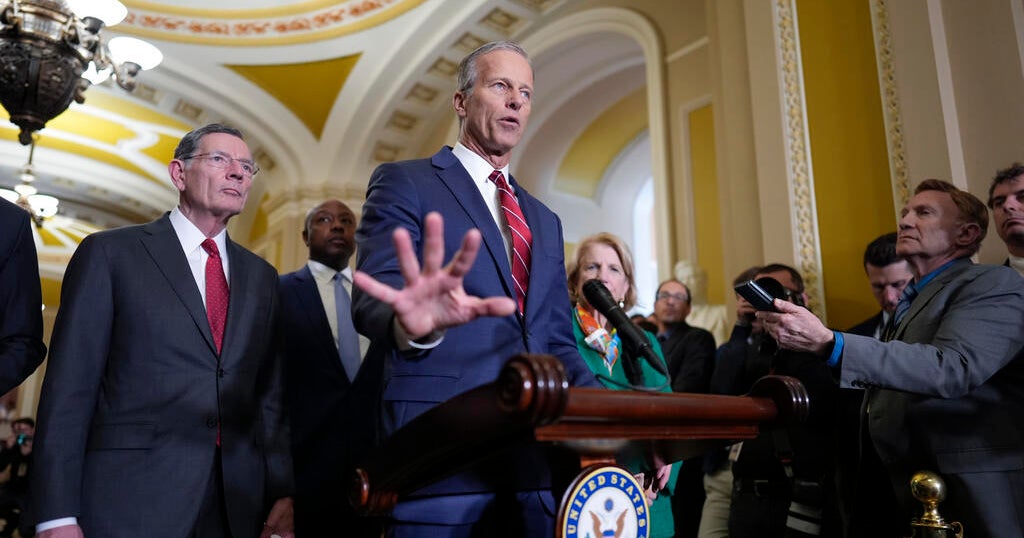Updated on: April 5, 2025 / 7:18 AM EDT
/ CBS News
Senate working on budget compromise
Washington — Senate Republicans adopted a budget resolution on Saturday after an all-night voting marathon, putting Congress one step closer to enacting President Trump’s agenda.
Senate Republicans unveiled a new 70-page budget blueprint Wednesday that lays out a path toward implementing Mr. Trump’s border security, defense, energy and tax priorities. The resolution aims to make tax cuts that were enacted during Mr. Trump’s first term permanent while also authorizing $1.5 trillion in additional tax cuts and raising the debt ceiling by as much as $5 trillion.
The Senate cleared a procedural hurdle Thursday with Sen. Rand Paul of Kentucky as the only Republican defection, setting it up for final approval this weekend after senators exhausted all amendment votes during what’s known as a “vote-a-rama.”
During the vote-a-rama, Democrats offered amendments that forced the majority party to cast vote after vote through the night on highly charged political issues, including Medicaid, Social Security and tariffs. The Senate adopted the resolution in a 51-48 vote, teeing it up for a vote in the House as soon as next week. Paul and Sen. Susan Collins of Maine were the only two Republicans who voted against it.
The Republican blueprint is just the first step in the complicated reconciliation process, which allows Congress to bypass the 60-vote threshold typically required to advance legislation in the Senate. Taking this route allows Republicans to pass the bill without help from Democrats. Both chambers must adopt identical budget resolutions that direct committees to submit their proposed spending plans before passing a bill meeting Mr. Trump’s priorities. The entire process is expected to take months.
Sen. John Barrasso, the No. 2 ranking GOP senator, said voters gave Republicans a mission in November, and the Senate budget plan delivers.
“It fulfills our promises to secure the border, to rebuild our economy and to restore peace through strength,” Barrasso said, according to the Associated Press.
The compromise resolution comes after Republicans in the House and Senate forged ahead on their own budget blueprints earlier this year, before coming together on the path forward. Still, differences exist over where and how to make spending cuts, as leaders have opted to push some of the lingering disagreements down the line.
The Senate set relatively low minimum floors for spending cuts for several committees, at just a few billion dollars, while it calls for at least $1.5 trillion in spending cuts over 10 years in the House. The Senate is expected to find far more than the floor outlined in the resolution, but the figures are aimed at giving them flexibility moving forward.
Senate Majority Leader John Thune defended the resolution on Thursday as laying the groundwork for “transformational investment” in border security, national defense and the energy sector.
The South Dakota Republican criticized Democrats, whom he said are “losing their minds” over the measure, for claiming the tax relief is “about handouts to billionaires.” He said Democrats’ “latest hysteria” centers on an accounting tactic known as a “current policy baseline,” which makes it appear as if making the tax cuts permanent costs nothing.
“Using the current policy baseline is not some bizarre new gimmick,” Thune said, adding that “Democrats’ sudden concern for saving money and protecting the character of the Senate is touching.”
But Congress usually uses a “current law baseline” for budget measures, as required under the 1974 Budget Control Act. This takes into account the expiration of spending provisions. So, the current policy would treat the extension of the Trump tax cuts, which are expiring this year, as a policy that will continue indefinitely and won’t cost any new taxpayer dollars. However, the tax cuts were passed in accordance with a current law baseline, which set an expiration date. So extending the cuts would mean incurring new costs, in this case, about $4.5 trillion over the next decade.
Senate Minority Leader Chuck Schumer, a New York Democrat, said Thursday that “Republicans, in essence, want to pretend like their trillion dollar tax cuts are free — like magic.”
“Middle school math students would tell you this is ridiculous,” Schumer said.
The framework now goes to the House, where Speaker Mike Johnson of Louisiana could bring it up for a vote as soon as next week as he works toward a resolution by Memorial Day.










